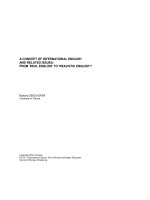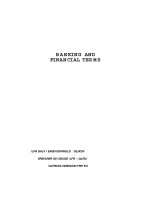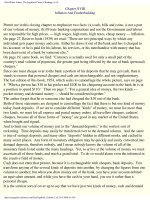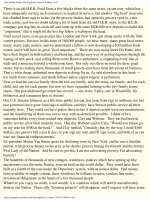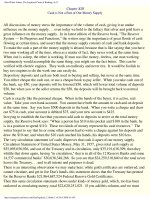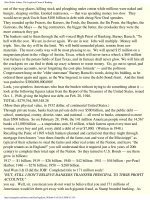International banking and investments
Bạn đang xem bản rút gọn của tài liệu. Xem và tải ngay bản đầy đủ của tài liệu tại đây (1.1 MB, 10 trang )
A. Choose the best words to go into the spaces.
36
Unit 0000
For reference see A & C Black Dictionary of Banking and Finance (978-07136-7739-3).
16. International banking and investments
1. Because Britain is an island, in British English, a bank account in another country is known as an
__________ account.
a. off-island b. off-coast c. offshore
2. Transferring money from Britain to another country is called sending money _________.
a. overseas b. over-water c. over-waves
3. A country with very low taxes is known as a __________.
a. tax heaven b. tax haven c. tax paradise
4. The principal aim of offshore banking in tax havens is to reduce the customer's tax __________.
a. liabilities b. expenses c. costs
5. A person of any nationality who normally lives in the UK is called a UK ________.
a. resident b. inhabitant c. citizen
6. A person with a UK passport is called a ________, even if they don't live in the UK.
a. UK resident b. UK inhabitant c. UK citizen
7. A person who is has a UK passport but doesn't normally live in the UK is called a ________.
a. non-resident b. non-inhabitant c. non-citizen
8. Jim mostly lives in Spain, but for tax __________ he's resident in the UK.
a. purposes b. registration c. payment
9. Jim is __________.
a. UK taxed b. UK taxable c. a UK tax-payer
10. Although she lives and works in Germany, Maria's company is __________ in Liechtenstein.
a. registered b. recorded c. officially situated
11. An informal way of saying that Maria lives in Germany is that Maria is __________ in Germany.
a. housed b. domiciled c. based
12. A formal way of saying that Maria lives in Germany is that Maria is __________ in Germany.
a. housed b. domiciled c. based
13. A __________ payment is a fast and secure way to make an international payment.
a. fast-track b. priority c. top priority
14. SWIFT is an international __________ payment system.
a. electric b. electrical c. electronic
15 A person who receives an international payment is called the __________.
a.
getter b. beneficiary c. receiver
B. Fill in the missing words. Then number these stages in order, 1 to 6.
C. Complete the chart below. Is each sentence true for UK-based unit trusts*,
offshore funds, both or neither?
37
For reference see A & C Black Banking and Finance (978-07136-7739-3)
funds ț identification ț prevailing
sterling ț tradable ț working days
Making a priority payment from the UK
If the payment is in a foreign currency, the bank carries out the currency
exchange at the _________________ rate.
The payment is sent by SWIFT.
Instruct your bank to make the payment. If transferring __________ to a bank
account, quote the beneficiary's IBAN (International Bank Account Number).
The transfer usually takes three or four _________________
The payment is credited to the beneficiary's account, or can be collected by
the beneficiary upon production of a suitable means of _________________
Decide if you want to send the payment in _________________ or in another
_________________ currency.
UK-based unit
trust
offshore fund
Aimed at private investors x x
Aimed at institutional investors, such as pension funds
Usually operated by fund managers
Liable for UK tax
Based in a tax haven
Usually based on a portfolio of stocks and shares
Regulated by UK authorities
May carry additional risks
A no-risk investment
Called a "mutual fund" in the United States
* For a definition of unit trust, see Unit 24 Investments
Bank of England raises interest rate to 5%
A. Choose the definition which is closest to the meaning in the article.
38
Unit 0000
For reference see A & C Black Dictionary of Banking and Finance (978-07136-7739-3).
17. National central banks (NCBs)
1. Mortgage repayments, along with the cost of
overdrafts and credit card debts, are set to rise after
the Bank of England surprised the City yesterday
by announcing its first rise in interest rates for
more than a year.
2. News of the quarter-point rise to 5% was
cautiously welcomed by some financial
institutions, but was largely condemned by
industry and trades unions.
3. A statement from the Bank of England’s
monetary policy committee said that strong
growth, a recent recovery in consumer spending,
buoyant export markets and signs of a pick-up in
investments meant that action was necessary in
order to meet the government’s 2.5% inflation
target.
4. The statement said: “With inflation likely to
remain above target for some while, it was judged
necessary to bring consumer prices inflation back
to target in the medium term.”
5. A response from the London Board of
Businesses and Exporters described the move as
premature, and likely to damage businesses,
especially those dependent on export earnings.
6. Many homeowners will face higher monthly bills
through increased mortgage costs, especially those
with variable rate and base-rate tracker mortgages.
If mortgage lenders pass on the rise in full, it will
add around £20 to the monthly repayments on a
£100,000 mortgage. According to Sarah Parker of
the Family Income Monitoring Unit, the average
family will need to find around another £40 a
month.
7. Few analysts predicted a rate increase, and some
had even been expecting a decrease to help boost a
subdued housing market. Many were talking about
the increase being a pre-emptive strike, with the
small increase in borrowing costs now intended to
ward off the need for a more painful rise later.
8. In the City’s money markets, however, there
were expectations of a further tightening of the
Bank’s policy and further interest rate rises -
perhaps up to 5.75% – unfolding over the next
twelve months. Fears that further rate increases
would affect consumer spending wiped £17bn off
the value of the London stock market.
1. the City (paragraph 1)
a. the people of London b. financial professionals working in London
2. a quarter-point rise (paragraph 2)
a. a 0.25% rise b. a 2.5% rise
3. consumer spending (paragraph 3)
a. money spent by businesses b. money spent by ordinary people
4. a pick-up in investments (paragraph 3)
a. an increase in share prices b. a drop in share prices
5. in the medium term (paragraph 4)
a. over the next few months b. over the next few years
6. a pre-emptive strike (paragraph 7)
a. an action taken before it becomes necessary b. an action taken after it becomes necessary
B. Find words in the article with the same meaning as the following.
C. Complete the definitions.
D. Which of the following are not
usually done by the NCBs of Developed
Economies?
39
For reference see A & C Black Banking and Finance (978-07136-7739-3)
7. steady economic expansion (paragraph 3) s______________ g______________
8. higher than desired (paragraph 4) a______________ t______________
9. too soon (paragraph 5) p______________
10. avoid (paragraph 7) w______________ o______________
11. occurring (paragraph 8) u______________
12. The move was condemned by industry means businesspeople thought the action was ____________
a. a good thing b. a bad thing c. neither good nor bad
13. Most banks passed on the 0.25% rise in full means that most banks increased their lending
rates by…
a. less than 0.25% b. 0.25% c. more than 0.25%
14. Base-rate tracker mortgages are ____________ the Bank of England's interest rate.
a. lower than b. the same as c. linked to
15. I'll need to find an extra £40 a month means that I'll have to ____________ another £40 a month.
a. pay b. earn c. save
16. A further tightening of policy is another ____________
a. review of targets b. policy reversal c. unpopular implementation of policy
17. £17bn was wiped off the value of the London stock market means that
a. fewer shares were traded in the UK b. UK share prices mostly went down
c. a lot of UK companies went bankrupt
a. Implement the government's monetary policy
b. Decide monetary policy
c. Hold reserves of foreign currency
d. Hold reserves of gold
e. Hold reserves of jewels and valuable paintings
f. Set exchange rates
g. Help the government manage the exchange rate if necessary
h. Manage the government's accounts
i. Provide current accounts for businesses
j. Issue banknotes
k. Control the money supply
l. Control banks' lending rates
m. Manage share issues
A. Match the terms with the definitions.
B. Look at these sentences about the economy of the United Kingdom. Do you
think the answers are TRUE or FALSE? (If you don't know, guess.)
40
Unit 0000
For reference see A & C Black Dictionary of Banking and Finance (978-07136-7739-3).
18. National economies and international trade
1. trade surplus
2. trade deficit
3. balance of trade
4. balance of payments
5. external debt
6. debt servicing
7. devaluation
8. growth
9. recession
10. gross domestic product (GDP)
11. gross national product (GNP)
12. national per capita income
a. Money owed by a country to foreign creditors
b. The accounts setting out a country's transactions with the
rest of the world
c. The value of a country's imports exceeds its exports
d. The accounts setting out a country's total imports and
exports.
e. The value of a country's exports exceeds its imports
f. Expansion of the economy
g. The value of all the goods and services produced by an
economy over a period (e.g. one year).
h. Contraction of the economy
i. GDP plus other forms of income such as interest, profits and
dividends received from abroad.
j. The national income divided by the population
k. The payment of interest on debts
l. Reduction in the value of a currency
1. The UK is a market economy. TRUE / FALSE
2. Most major industries are state-owned. TRUE / FALSE
3. Many state-owned industries were privatised in the 1980s. TRUE / FALSE
4. The pound was floated in 2006. TRUE / FALSE
5. The UK owes several trillion pounds to the IMF (International Monetary Fund). TRUE / FALSE
6. The UK spends nearly a quarter of its GNP on servicing external debt. TRUE / FALSE
7. The UK has never experienced hyperinflation. TRUE / FALSE
8. The UK has never had a trade deficit. TRUE / FALSE
9. In 2006 the UK economy shrank slightly. TRUE / FALSE
10. From 1990 to 2005, the UK economy experienced double-digit growth. TRUE / FALSE


